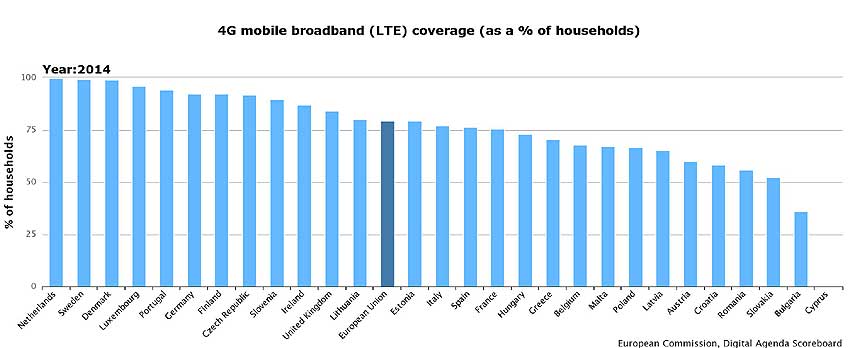The telecommunication network spreads over the globe and in fact it is the largest and most complicated machine created by man. Data from the International Telecommunications Union (ITU) for 2014 show that the number of users of mobile services is almost equal to the world's population (about 6.9 billion). In today's dynamic digital world development of the telecommunications sector is of increasing importance for the socio-economic progress of a society, as it offers products and services that can be used anywhere, anytime, on any device and with guaranteed quality. According to market forecasts, in 2015 smartphone sales will be higher than those of PCs, tablets and video games combined.
On September 15, 1995 the official launch of the first GSM network in Bulgaria took place. It started working with six base stations covering the central parts of Sofia. Twenty years later the total number of active UMTS base stations in this country is nearly 5000. 3G coverage reaches 96% of the country’s area and 99% of its population.
Since the summer of 2014 in Bulgaria the LTE (fourth generation) mobile internet standard started to be offered to users. Bulgarian customers using LTE, are 0.3% of all mobile Internet users. According to plans, offered high-speed internet access will provide download speeds of up to 75 Mbps and upload speeds of up to 25 Mbps, as the volumes of data traffic at maximum speed depending on the selected tariff plan can reach up to 300 GB per month.
According to the EU in 2014 Bulgaria ranked last among the Member States with 36% of households living in areas with a network of the fourth generation, with an average level of 80 percent for Europe.

The 4G frequencies are 900, 1800, and 2100 MHz and mobile operators show interest towards these bandwidths in order to develop cellular networks of fourth generation. Currently, the 900 MHz band is divided equally among the three largest operators in this country. In early September the Commission for Regulation of Communications (CRC) announced that it would hold a tender for permits for using 2,50-2,69 GHz. These frequencies will enable mobile operators to develop their fourth generation networks.
In a relatively short period of time in Europe three generations of standards for mobile networks have changed, and Japan has ambitions to be the first country with a working 5G network, which is expected to be operational for the start of the summer Olympic Games in Tokyo in 2020. 5G networks will reach speeds greater than 1Gbps, which will allow downloading an HD movie for 30 seconds. The development of standards for 5G networks in Europe is part of the 5G PPP project, which is under the framework of the "Horizon 2020” program of the EC with a budget of 6.2 billion euro.
In June 2015 an agreement between the European parliament and the EU Council was reached for ending roaming charges in the EU. This will happen on 15 June 2017. Currently a one-minute call costs 0.19 euro; SMS messaging costs 0.06 euro, and a MB of data is 0.20 euro. Since May 1, 2016 these prices will fall respectively to 0.05, 0.02 and 0.05 euro (excluding VAT). Under the new agreement, mobile users traveling in the EU will pay the same price for calls, text messages and the Internet just like in their home country. This is not the first time that the EU promises to put an end to roaming charges. Last year, the European Parliament voted to end the practice on December 15, 2015. However, the move was postponed because of concerns about the effect on the telecommunication market and speculations that operators would just raise local tariffs to compensate for losses.
In recent years TV sets have significantly evolved and now they offer improved quality. This has also had an effect on the cable operators. More operators offer TV channels in high resolution to consumers.
In Bulgaria there is not much price competition among mobile operators, but rather they strive to attract customers by offering additional services, promotional packages and others. The number of users who sign agreements with operators continues to grow at the expense of the number of users of prepaid services. In 2014 over three million people used mobile Internet - the result of the rising number of services and packages offered.
It seems that in the long term the number of users of mobile services would grow. The development of next-generation networks is also expected to make the number of people using high-speed internet access grow. Many observers forecast that in the next decade, mobile internet will reduce the importance of fixed broadband networks, as well as that of traditional fixed voice services.
English: Alexander Markov
Digital nomadism, a lifestyle where people choose remote work so they can travel and live in different environments, is becoming a phenomenon on the way to overturn our ideas about work and way of life. In this regard, Bulgaria offers a palette of..
On 26 and 27 April, Sevlievo in Central Bulgaria is hosting the festival “Seme Balgarsko ”. For its 11 th edition, the organizers have a colourful traditional lineup. “The festival will enable visitors to meet manufacturers of Bulgarian..
The group cycling tour along the tourist route of the Black Sea Route Epic Tour 2025 started today . According to the extreme sports website 360mag.bg, a group of more than 30 cyclists will spend ten days riding along coastal paths through forests,..
Digital nomadism, a lifestyle where people choose remote work so they can travel and live in different environments, is becoming a phenomenon on the way..

+359 2 9336 661
